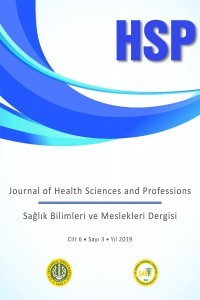Ebelik Bölümü Öğrencilerinin Empatik Eğilim Düzeylerinin Belirlenmesi
Empati, empatik eğilim, ebelik öğrencileri, ebelik eğitimi
-
Empathic tendency, midwifery students, midwifery education,
___
- Akça Ay F. Sağlık uygulamalarında temel kavramlar ve beceriler [Basic concepts
- practice]. 1. Baskı, İstanbul: Nobel Tıp Kitabevleri; 2013. p.72,106.
- medical 2. Cevahir R, Çınar N, Sözeri C, Şahin S, Kuğuoğlu S. Ebelik öğrencilerinin devam ettikleri sınıflara göre empatik becerilerinin
- [Evaluation of the empathic skills of midwifery students with respect to the classes they are attending]. Fırat Sağlık Hizmetleri Dergisi 2008; 3(7):6-7.
- Mete S. Gerçek E. PDÖ yönetimiyle eğitim gören hemşirelik öğrencilerinin empatik
- incelenmesi [The examınatıon of empatıc tendency and skılls on nursıng students who are educated wıth pbl method].
- Yüksekokulu Dergisi 2005; 9(2): 11- 17. ve
- becerilerinin Hemşirelik 4. Badea L, Pana NA. The role of empathy in developing the leader’s emotional ıntelligence. Theoretical and Applied Economics 2010; 543(2): 69- 78.
- Sabancıoğulları S, Kelleci M, Doğan S, Gölbaşı Z. Entegre eğitim programında öğrenim öğrencilerinin
- düzeylerinin yıllara göre incelenmesi [The empathic tendency in nursing students educated with ıntegrated method according to the years] . Cumhuriyet Üniversitesi Hemşirelik Yüksekokulu Dergisi 2007;11(2):1-6.
- Üstün B. Çünkü iletişim çokşeyi değiştirir [Because communıcatıon has more changed]. Atatürk Üniversitesi Hemşirelik Yüksekokulu Dergisi 2005; 8: 88-94.
- Reynolds W, Scott B. Do nurses and other professional helpers normally display much empathy? Journal of Advanced Nursing 2000; 31: 226-234. 8. Öz F. Son sınıf öğrencilerin empatik eğilimleri, empatik becerileri ve akademik başarıları arasındaki ilişki [The relations between empathic tendency,
- academic performance of senior students
- Üniversitesi Hemşirelik Yüksekokulu Dergisi 1998;2(2): 32-38.
- and of nursing]. Cumhuriyet 9. Rogers CR. Empatik olmak değeri anlaşılmamış bir varoluş şeklidir [Be empathicis a way of being undigested value]. Çeviren: Akkoyun F. A.Ü. Eğitim Bilimleri Fakültesi Dergisi 1983;16(1):103–124.
- Dökmen Ü. İletişim çatışmaları ve empati [Contact conflict and empathy]. 39. Basım, İstanbul: Sistem Yayıncılık; 2008. p. 119-150.
- Çiçek A. Sağlık çalışanlarının empatik eğilim
- değerlendirilmesi [The evaluation of empathic tendencies and skills of heallth staffs] [Yüksek Lisans Tezi]. Marmara Üniversitesi Sağlık Bilimleri Enstitüsü Sciences,
- İstanbul, Türkiye, 2006.
- becerilerinin [Institute Marmara
- University], 12. Öz F. Hemşirelikte özgecilik [Altruism in nursing]. Cumhuriyet Üniversitesi Hemşirelik 1998; 2(1): 53-58.
- Dergisi, 13. Öz F. Hemşirelerin Empatik iletişim becerisi ve eğilimine eğitimin etkisi [Effect of training on nurses' empathic skills and empathic tendency] [Doktora Tezi]. Hacettepe Üniversitesi Sağlık Bilimleri Medical
- University], Doktora Tezi, Ankara, 1992. [Institute
- of Hacettepe 14. Van Baaren RB, Decety J, Dijksterhuis A, Van Der Leij A, Van Leeuwen ML. Being ımitated: Consequences of nonconsciously
- Decety J, Ickes W. (Eds), The social neuroscience of empathy. Cambridge, MA, USA: MIT Press. 2009: 31-42.
- Çakmak A, Demirbaş A. Review of the emphatic tendencies of university students in terms of some variables. International Journal of Humanities and Social Science 2014; Vol. 4, 7(1); 29-33.
- Küçük Piji D. Müzik öğretmeni adaylarının empatik eğilimleri ile iletişim becerileri arasındaki ilişkinin incelenmesi [Determınatıon of the relatıonshıp
- tendencies and communication skills in musıc teacher candıdates] . 2nd International Conference on New Trends
- Implications Antalya:Sistem Kitabevi; 2011. p. 935-942. empathic in and
- Their 17. Yiğitbaş Ç, Deveci SE, Açık Y, Ozan AT, Oğuzöncül AF. Sağlık eğitimi alan bir grup öğrencinin empatik eğilim ve becerisi [The empathic tendency and empathic skills of a group of students receiving health education]. S.D.Ü Sağlık Bilimleri Dergisi 2013;4(1):7- 13.
- Tutuk A, Al D, Doğan S. Hemşirelik öğrencilerinin iletişim becerisi ve empati
- [Determining communication skills and belirlenmesi emphatic levels of nursing students].
- C. Ü. Hemşirelik Yüksek Okulu Dergisi 2002; 6 (2): 36-41.
- Dereboy Ç, Harlak H, Gürel S, Gemalmaz A, Eskin M. Tıp eğitiminde [Teaching
- education]. Türk Psikiyatri Dergisi 2005; 16(2):83-89.
- öğretmek medical empathy in
- Dizer B, İyigün E. Yoğun bakım hemşirelerinde
- düzeyleri ve etkileyen faktörler [The empathic tendency in the critical care nurses and the factors affecting]. Atatürk
- Yüksekokulu Dergisi 2009; 12(1):9-19. Hemşirelik 21. Karaca A, Açıkgöz F, Akkuş D. Eğitim ile empatik beceri ve empatik eğilim geliştirilebir
- yüksekokulu örneği [Retrospectıve evaluatıon of the urgency of patıents admıtted to the emergency department by ambulance]. Acıbadem Üniversitesi Sağlık Bilimleri Dergisi 2013; 4(3): 118-122. bir sağlık
- ISSN: 2148-7588
- Başlangıç: 2014
- Yayıncı: İstanbul Üniversitesi-Cerrahpaşa
Kemik İliği Nakli Planlanan Hastaların Umutsuzluk Düzeyi ve Etkileyen Faktörler
Sağlık Bilimleri Fakültesi Öğrencilerinin Çocuk İstismar ve İhmali İle İlgili Görüş ve Düşünceleri
Melahat AKGÜN KOSTAK, Cemine VATANSEVER
Escobar Sendromu’nda Fizyoterapi ve Rehabilitasyon: Olgu Sunumu
Devrim TARAKCI, Ela TARAKCI, Burcu ERSÖZ HÜSEYİNSİNOĞLU
Sağlık Bilimleri ve Meslekleri Dergisi Yıl 2015 Sayı 1
Sağlık Bilimleri Ve Meslekleri Dergisi HSP
İnfertilite Stresi ile Başa Çıkma Yöntemleri ve Hemşirelik Yaklaşımları
Tülay YILMAZ, Ümran YEŞILTEPE OSKAY
0-6 Yaş Grubu Çocuklarda Ev Kazaları
Fatma Yılmaz KURT, Aynur AYTEKİN
Vardiyalı ve Nöbet Sistemi Şeklindeki Çalışma Düzeninin Hemşireler Üzerine Etkisi
Kıymet YEŞİLÇİCEK ÇALIK, Songül AKTAŞ, Hacer KOBYA BULUT, Elif ÖZDAŞ ANAHAR
Ebelik Uygulamalarında Mahremiyetin Önemi
Göğüs Cerrahisi Hastalarının Yoğun Bakım İhtiyaçlarının İncelenmesi
